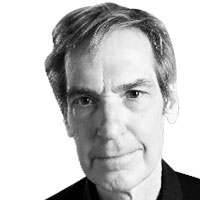As I eye the advertisements for the film adaption of August Wilson’s Pulitzer and Tony Award-winning masterpiece Fences, starring—and directed by—Denzel Washington, I think back to a day in 1993 when I paced around a suite in the Waldorf Astoria chatting with George Foreman.
Foreman had arrived early for his appearance on The Dick Cavett Show. I was the producer of Cavett’s CNBC series, but—as Foreman’s lawyer explained when he introduced me to Big George—I’d also recently published a history of old-time boxing trainers.
“Which trainers?” Foreman asked suspiciously as his face took on the displeased expression he displayed when an opponent had the temerity to punch him in the face with a stiff left jab.
I mentioned Joe Louis’s trainers, Rocky Marciano’s trainer, and a few others, but Foreman’s mood darkened. My wife, making a rare appearance at a taping, stood in the corner snapping photos of me looking quite small and abashed beside the immense past- and future-heavyweight champion of the world.
“Archie Moore worked in your corner in the Ali fight, right?” I asked finally, breaking a weighty silence.
Moore was the former light-heavyweight champ, a fine fighter who’d fought over 200 professional fights.
“Yeah,” Foreman said.
“Did Archie ever tell you about Charley Burley?”
Burley, a boxer from the ’40s and ’50s—and a legend among boxing cognoscenti—was a natural middleweight who often fought and defeated much larger men, including the great Archie Moore.
Foreman nodded.
“Well,” I said, “I think I’m the last person who ever interviewed Charley Burley. I wrote an article about him for Ring magazine. You were on the cover of that issue.”
With that, Foreman transformed from the moody George Foreman who grunted his answers to reporters before his fight with Ali into the amiable grill salesman and American icon.
“Let me shake your hand again,” Foreman told me. “Now I respect you.”
“Don’t tell me, tell my wife.”
“I respect your husband,” he told her with his big pitchman’s smile, and I suspected for more than a moment that my life might be downhill from there.
Which brings us to Fences.
Wilson’s play tells the story a former Negro Leagues baseball star who never was allowed to cross the “color line” and compete in Major League Baseball. Burley, it turns out, was an inspiration for Troy Maxson, the hero of the play.
I learned this while chatting with Julia, Burley’s wife of 50 years. The Burleys were staying in their daughter’s home in Pittsburgh’s Hill District, the neighborhood which is also the location for Wilson’s 10-play cycle about African-American life in the 20th century.
“You’re from New York,” Julia Burley said. “We go up there to see August’s plays.”
“August? August Wilson?”
“He grew up across the street.”
The parallels between Burley and Wilson’s hero were immediately apparent.
Like Charley Burley, the fictional Troy Maxson was denied a shot at the big time and ended up earning his living as a sanitation worker in his native Pittsburgh. Wilson, however, added a layer of complexity to the story: In the play, Maxson served time in prison for a murder that occurred as a result of a robbery gone wrong.
Yet when I interviewed Wilson by phone for the Ring article, he confirmed that Burley was the inspiration for the play.
“I grew up without a father, and the male image that was in my life… was Charley Burley. And that’s what being a man meant to me, to be like him. I wanted to grow up and dress like him. He wore those Stetson hats and things of that sort, and I couldn’t wait until I got to be a man to be like Charley Burley.”
Though Burley was a garbage man, Wilson reported, “Everybody always called him Champ. And for a long while I was growing up, I thought he was the champion.”
Was Troy Maxson based on Burley?
“I suspect so, maybe unconsciously,” Wilson said. “Troy Maxson has the magnificent spirit that I saw in Charley Burley.”
Just as Troy Maxson never got a chance to play in the big leagues, Charley Burley was never granted a title fight. During my interview with Burley, he displayed a remarkable lack of bitterness about his fate as he recalled his victories over champions of his era.
“Archie Moore, I beat him in Hollywood,” Burley said. “Fritzie Zivic, I beat him twice and they wouldn’t give me a chance at the title.” Another champion who avoided Burley was Sugar Ray Robinson, arguably the greatest boxer who ever lived.
“Ray ducked me,” Burley once told the Village Voice. “But I can’t really say I blame him. There wasn’t no money in our fighting each other. All we’d have done is knock each other out... It’s just that they weren’t gonna give two black guys a chance like that in the same era, you know? God said to both of us, ‘Which one of you wants to be Sugar Ray?’ And I guess I didn’t raise my hand fast enough.”
It was this equanimity that most moved Wilson when discussing Burley.
“I think lesser people with less force of character would have allowed that kind of thing to eat at them until they destroyed themselves and ended up a bum on the street all because of this raw deal that they got and be consumed by their bitterness,” Wilson told me. “Charley wasn’t like that. He just took it as it came along. In fact, he felt that he was blessed.”





